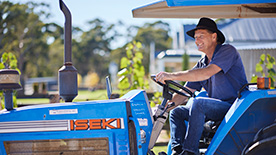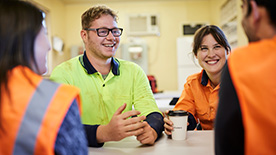Silicosis (respirable crystalline silica)
Silica dust is generated when materials containing silica are cut, sanded, polished, drilled or blasted. When this dust is inhaled into the lungs it can cause silicosis, a disease which leads to scarring, swelling and fluid build-up in the lungs, interfering with a person’s ability to breathe.
Silica is found in many materials common on construction sites, including soil, concrete, masonry, rock, granite and landscaping materials.
If your patient works in an environment where they are exposed to silica dust, encourage them to speak to their employer about how they can reduce their exposure. If your patient is concerned that they may have been exposed to silica dust, they should seek an assessment at a Thoracic Clinic. Early detection and control of further exposure to silicosis is important and is likely to lead to better outcomes.
Silicosis health assessments
Diagnosis of silicosis is based on a comprehensive clinical and radiological assessment consisting of:
- an occupational history with details of current and/or previous work sites, job tasks, use of personal protective equipment and exposure to silica dust
- respiratory symptoms such as cough (productive or non-productive) and shortness of breath on exertion
- a clinical examination, focusing on the respiratory system
- lung function testing to Thoracic Society of Australia and New Zealand (TSANZ) standards
- an ILO chest x-ray to be read by an ILO qualified B reader
- a high resolution CT scan of the chest.
Support for your patient during silicosis health assessments
We understand that being tested for silicosis may make your patient worried or anxious about what this means for them and their family, and support is available during time.
For more information on the available support, visit our worker page.
Silicosis work injury claim
If your patient has been diagnosed with silicosis, they can contact us on 08 8233 2545 or email silicosis@rtwsa.com to start the claim. A specialist team within ReturnToWorkSA will work closely with them to assess and manage their claim and arrange the care and support to best manage their condition.
More information:
Further resources
The Royal College of Physicians AFOEM and the Thoracic Society of Australia and NZ (TSANZ) have created public resources which are available online here.
SafeWork Australia has released Health Monitoring Guidelines for Crystalline Silica available online which provides practical guidance about requirements under the WHS laws for health monitoring.






 Date printed: 15 Apr 2025
Date printed: 15 Apr 2025

